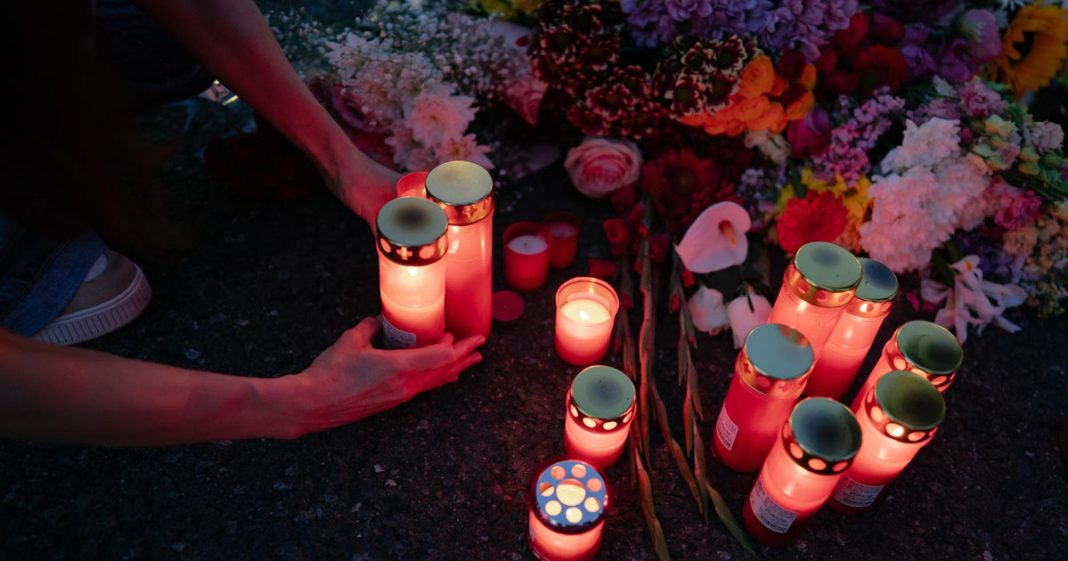The Facebook message that popped into her account started as a flirtation: “Hey, how are you?”
She had newly arrived from Bangladesh to study for her master’s in information technology on a student visa in 2022 and wasn’t interested in a relationship.
She liked the message. Then he texted again a few days later, “Hey, I have tickets to a Broadway show.”
She had never been to a Broadway show before, so she went — and their whirlwind first date quickly turned to love for her and then marriage. On Feb. 14, 2024, the couple joined the line to get married at the New York City courthouse.
“I brought a white dress online, not very fancy and white shoes, tiara and flowers,” she said. “I was smiling, just looking at him. I felt really good.”
Her new husband filed for a green card for his wife. A temporary one was granted, and she moved to his family’s house in Brooklyn.
The future seemed bright.
A rise in the threat of deportations
Now, just a little more than a year later, the 31-year-old woman, who asked CBS News not to use her name due to safety fears, has separated from her husband after alleging abuse — and is now worried about being deported.
As immigration enforcement raids increase in the U.S. – including operations in Los Angeles, which led to protests that prompted President Trump to mobilize National Guard troops — communities are shaken watching the deportations of families, friends and co-workers.
One community that’s especially vulnerable, experts say, are victims of domestic violence. Crystal Justice, chief external affairs officer at the National Domestic Violence Hotline, told CBS News in a statement that they have seen abusive partners “threatening to deport a partner or their family or withholding legal documents to limit a person’s ability to travel.”
Many immigrants are in the U.S. on a visa supported by a U.S. citizen, or are undocumented, with few protections. Often, as the relationship spirals into abuse allegations, spurned or angered partners can threaten to deport their loved ones with uncertain immigration statuses.
Esther Limb, immigration practice director at Her Justice in New York City, a not-for-profit that advises and trains attorneys to provide free legal help to women, said there has been a rise in the threats of deportations by abusers.
“While using immigration status against their victims is a common tactic used by many abusers, by echoing the anti-immigrant rhetoric and pointing to immigration enforcements happening in their communities, the threat of deportation by abusive spouses is louder than ever and allows abusers to wield greater power and control over their victims,” Limb said.
A massive backlog and long waits
Limb represents numerous clients — including the one interviewed for this CBS News piece — in filing petitions to stay in the U.S. after alleging domestic violence. Waiting for an answer to these petitions can take years due to backlogs and vetting for the applications.
Immigrants who allege abuse can file to stay in the U.S. under the Violence Against Women Act, but those petitions can come with a wait of sometimes more than 36 months for an answer. These applicants are close relatives of U.S. citizens and lawful permanent residents, and they can file for status on their own, without the abuser’s knowledge, consent or participation.
There were 35,917 VAWA petitions in 2024, according to data from U.S. Citizenship and Immigration Services. Petition filings have increased by more than 350% in the last decade. In 2014, there were 7,130 filings.
Immigrants — including undocumented immigrants — can also file for a nonimmigrant status visa, known as a U-visa, if they were victims of various crimes, including domestic violence. The wait time for final approval is more than eight years, due to a massive backlog of petitions, Limb said. There were 41,558 petitions filed in 2024, doubling over the past decade, according to USCIS data. There are more than 238,000 cases currently pending.
People are “very, very scared”
In the meantime, immigrants watch, wait and worry, hoping their petition will be approved, like the woman interviewed by CBS News. She said she cries suddenly at work sometimes, waking up at night and constantly looks over her shoulder.
She left her husband, she says, after various incidents of verbal and physical abuse. She claims the police came to their house, and she went to the emergency room, where she says the hospital told her she had to make a police report. She was given a list of what constitutes domestic abuse.
“I didn’t want to go back,” she said. “…I didn’t know what to do.”
She said her sister, who immigrated to the U.S. years ago came to visit her from Connecticut and told her, “You don’t have to go back.” She then cut off all contact with her husband and his family.
Then the messages and threats started.
CBS News reviewed text messages and documents at the Her Justice office in New York City, allegedly from the client’s former partner threatening to call ICE and deport her. She filed for a VAWA petition, her lawyer said. CBS News viewed videos of the couple’s wedding day and interviewed the client, but did not reach out to the former partner for safety concerns for the client.
One message read, “1. You are my wife. 2. I am your petitioner. Lawfully you cannot just leave, as an American you are my responsibility. I’m sorry but I warned you.”
CBS News/ Handout
Others were sent to her sister. One text message said, “I will be reaching out to immigration soon.” Another said, “ICE can show up any day and deport.”
Limb said abusers now have more power and control right now as they know they can use their partners’ immigration status in the current climate.
“That is more scary than anything else for a lot of our clients to be deported or to be removed and/or separated from their children,” Limb said. “People are very, very scared.”
For anonymous, confidential help, people can call the National Domestic Violence Hotline at 1-800-799-7233 or 1-800-787-3224. People can text START to 88788 or chat on TheHotline.org.




